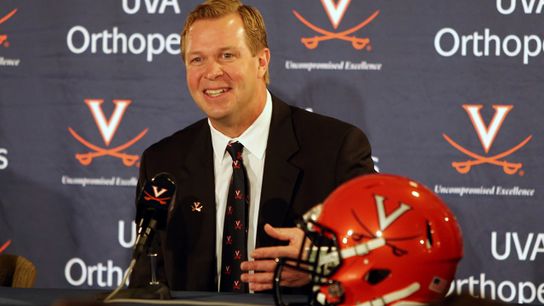Last month the NCAA passed legislation that installs a 3-day December signing period and permits recruits to take official visits in April, May and June of their junior years. Each of these rules were the result of years of debate on each issue. The early signing period was supported by the AFCA, with executive director Todd Berry stating the December signing period had unanimous support from FBS coaches.
On Wednesday, ACC coaches emerged from conference meetings with unanimous complaints against the new legislation. North Carolina's Larry Fedora went as far to say he'd give back a 10th assistant coach in order to unwind the new recruiting calendar.
From ESPN's Andrea Adelson (emphasis added):
North Carolina coach Larry Fedora said he would trade the addition of a 10th assistant coach to get the new changes to the recruiting calendar undone. ACC coaches unanimously expressed frustration with the new rules, including spring official visits and a December signing date. "It's almost like they were dangling that and said, 'OK if you want this, you've got to take all this other stuff,'" Fedora said. "Kind of like the way our government works. Isn't that the way that works? Let's stuff some things in there, whether you want it or not, and if you want these things, you're going to have to take this."
How can every FBS coach be in favor of something every ACC coach is simultaneously against? They can't, of course.
"My thoughts on the early signing period are really two-fold. Number one, I support the early signing period simply because the majority of players that are choosing to play for me and the University of Virginia and the previous place where I coached, roughly 85 percent of them, almost 90, had chosen to commit and choose to play for me prior to their senior season," Virginia's Bronco Mendenhall said in audio provided to FootballScoop from UVa. "Knowing that they were that firm and committed, all that they did by having to wait to February was extend time and resources not only of the family but the institution when everyone was anxious to be moving on sooner. The early signing period allows us to do that. I think that decision was wise and makes sense in the current landscape of college football.
"The second point, which I am not for, is the acceleration of the recruiting model which most likely will come from this, if it's possible to accelerate any earlier. I would like a combination of an early signing period, which doesn't change at all the recruiting model we currently have, but I would like more restriction on the contact, evaluation and/or recruitment of the younger prospects, and I would like that to be slowed down, and I think both are possible, so I'd like to find the sweet spot between both."
“I think we’re making a huge mistake on the recruiting calendar,” Miami coach Mark Richt told the Orlando Sentinel. “I don’t know if anybody who’s really for it. We’re trying to figure it out ourselves.”
“It’s the addition of an April, May and June officials visits, which I don’t think there is a coach in America who is for that. There’s not a coach that wants that to happen,” Pitt's Pat Narduzzi added.
It's unlikely any issue related to recruiting will receive 100 percent approval across the board from 128 FBS head coaches, and anyone with experience dealing with the public will tell you those with complaints are much more likely to come forward than those with compliments.
Still, an entire conference has come out against the recruiting calendar, and this doesn't even address the nearly unanimous (or is even that too much of a qualifier?) outrage at the IAWP rule.
So how did the NCAA pass rules -- with the AFCA's support -- that its coaches despise?
One reason: the AFCA pushed strongly for all recruiting issues to be voted on as a package.
"With one signing day it doesn’t necessarily provide the clarity that these young people need in order to make the decisions. XYZ University is a big university and they’re continuing to recruit a young man because they’re not sure who’s going to sign with them in February, but the likelihood of that actually happening is pretty minimal. That young person then feel like they need to stay around instead of taking opportunities," Berry said in an April interview. "What this does is allows for that young person to have good information because if they’re signing in December they’ve got a good opportunity they’re looking for. If they’re not signing in December then holding on and waiting for XYZ University when they know they’ve already committed all their quarterbacks is tough. This, again, provides that young man with clarity in January when they can start taking visits to those universities that really are interested in him."
"As I mentioned earlier, this is part of a package. If you’re going to do that then you need to have the opportunity for earlier official visits. I think this is going to provide a lot of clarity also for the student-athlete and their parents in the sense that if they’re invited to an official visit in the spring then they know that institution is very much interested in him. If they’re not invited then they need to probably go find some places that are interested in inviting them to an official visit in the spring. They are interrelated and they’re tied together because they are intertwined."
Much like the pork that greases the wheels of Congress, the recruiting package was bundled together where rules many wanted -- a December signing period, the 10th assistant -- were combined with other rules many more didn't -- spring official visits, the IAWP rule. It's simply bewildering that, after years of discussion and debate, the package couldn't be broken out and voted on piece by piece.
